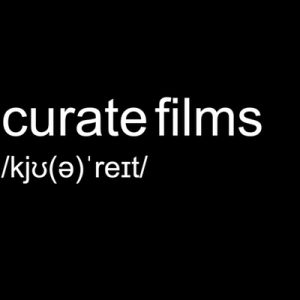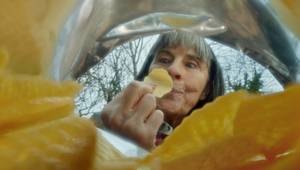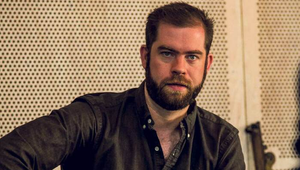
Why The Writers Room Wants to Bring Back the Funny

Madeleine Sanderson and Dan Dickenson met years ago at the production company Partizan, helping great directors do their best work. Together they helped Michel Gondry direct some of the most iconic music videos of all time.
In 2019 the pair teamed up after years working apart to produce the web series ‘Families Reunited’ for Cadbury. Off the back of that Curate Films was born - a long form production company specialising in features, TV formats and traditional commercial content. Their focus from the start was writer/director talents, but soon the pair landed on the idea of trying something new.
The Writers Room was born alongside Curate - a ‘creative comedy think tank’ of writer/directors that have a desire to write within the branded arena, but whose day job is making people laugh on stage, TV and Film. The roster of talent spans all areas of comedy, from satirical talk shows, BAFTA-winning sitcoms, to TikTok superstars.
To find out why the pair felt there’s space in today’s advertising landscape for bolt-on funny writing services, LBB’s Alex Reeves had a natter with Madeleine and Dan.
LBB> What was the insight that led to building a roster of comedy writers into your business?
Dan> If you look at all good TV and films, the reason it’s good is because of the writing. It always has been. Writers are the key. And I knew that from working with Sharon Horgan [at Merman, where Dan worked previously] who wrote Catastrophe and Motherland. Directors have to be good of course, but they come to the gig once it's written.
Madeleine> And they get the directors in way later.
LBB> Why is comedy what you decided to focus on specifically?
Dan> There are some brilliantly visual ads, and that’s fine. But I think we’ve been suckered over the last 10 years into advertising treating people as consumers rather than people. I think what we need to go back to is treating people as people. John Webster, one of the greats of advertising writing, was very much of that ilk.
We feel that if you can get funny people who make their living out of making people laugh, surely it’s a good thing for agencies and brands alike to get them in, do a workshop for a few days or a week, and we can punch up their ideas. But if we punch up ideas it has to be before they go to the client. They cannot go to the client beforehand get approval and then see if our writers can make it better, it's better to do all of this before it goes to client.
Madeleine> Lots of the comedians say they’re called in when they’ve got to read the voiceover. And [the agency] say ‘hey, while you’re there, can you make this funnier?’ No, it doesn’t work like that.
Dan> You’re then asking them for their creativity when they’re not getting paid for that creativity.
I was talking to a head of TV a few weeks ago who loved the idea [of The Writers Room]. He said they usually go to a director to get it 20% more funny, rather than try and get someone else to write it. That’s ludicrous because you need to make sure it’s funny before any director goes near it.
It’s about how we can try and make it better. We’re not an agency; we don’t want to be an agency, but we do want to be someone who agencies and brands can come to so we can help them out and try to make stuff funnier.
LBB> Why is comedy so important in the middle of a pandemic? Does that factor into how you’re pitching the business?
Dan> Right now is the perfect time to look at different ways of working. People are more reticent to spend as much money. People need to have a laugh at the end of all of this. I think funny will be selling more than anything else. Those emotional ads that have been going for the last 10 years.
Madeleine> It shows what’s happening in society - everyone being mindful and speaking about their emotions. And that’s being reflected in the advertising.
Dan> And that’s absolutely fine. But how often in shows or films do you recall the emotional moments? You recall the funniest bits. You remember the time in The Office when he did that stupid dance.
Madeleine> Or when Sally faked the orgasm in When Harry Met Sally.
Dan> Exactly. Funny lasts forever.
Madeleine> We just want to bring back the funny. And we think now is the perfect time.
Dan> We need it.
LBB> How did you go about assembling your roster of writers?
Dan> The writers we’ve got on, some of them are celebs in their own right. We went after funny people. And we’ve got a great balance of younger comedians and writers, against the old school like Johnny Vegas and Sue Perkins, who are really smart. Their thought processes are so impressive. They really get it.
Amelia [Gething] is new and she doesn’t want to make her life in advertising, but she could definitely help advertising because she’s built 7 million followers on her own. Some brands would kill for that. She’s advertised her way into that just by doing what she does. That’s a feat on its own. She’s a prime example of a new way of advertising. Because obviously brands want to attach themselves to a platform with lots of eyes on.
And they’re all super keen to talk with brands and agencies. What’s happened before is that they’ve been brought in too late, or rung up and asked to do something that’s not quite in their realm. That’s the wrong way to go about it. You’ve got to get them in right at the beginning of a brief.
When we first approached these guys, we told them exactly what we’ve told you. Everyone watches TV. Everyone sees advertising. Lots of them feel the idea is good but the execution is clunky. It works. But it could work a lot better. Everyone said the same thing. These days we feel that if clients gave agencies more time to collaborate with other specialists the whole idea would come to life, creatives are brilliant but they can’t be expected to think of ideas, and then to suddenly become a funny person, some are that talented, but if not then we can help.
LBB> What is the dream sort of project to bring all of this together?
Madeleine> What the ideal would be is, do you remember the Oxo family? They had these little episodes of commercials that you wanted to watch. If we could do that, but make it funny, it’d be perfect.
The reason we took on writers in the beginning was to help develop longer form content, but then Dan had a brilliant way of saying actually we could offer this service to our mates in advertising. Funnily enough that has led to us doing this webisodical thing with a drinks brand, which we’re doing at the moment.
LBB> When do you think the heyday of funny advertising was, and why was it so good then?
Madeleine> The funny ones were CDP, John Webster. It was the ‘80s.
Dan> The ‘70s and ‘80s. And I think the reason why they were funny, if you look at the great ones, like Hamlet, Cinzano or Smash, they were all about dialogue and situations that people could relate to. It wasn’t so far out of a person’s realm that it wouldn’t ever happen to them. Everyone has embarrassing moments, like Hamlet cigars. Or the Heineken advert, ‘the water in Majorca don’t taste like what it oughta’. The characters in those are all relatable. They’re people who we might know.
Madeleine> I like in Hamlet, the ethos of trying and trying and then ‘oh fuck it’. And then, ‘ah this is nice’. How to transition between those two emotions. That’s why TikTok is so popular. When I’m down all I do is scroll on TikTok and after five minutes I’m back up again.
LBB> Which is where some of your writers came up, right?
Dan> Amelia’s got 7 million subscribers there.
The thing about TikTok is you’re free to do what you want. With clients you have constraints. But the reason I think they’re constrained is because they’re so worried about selling and what the ad’s going to do for them. Is this ad going to sell a million packs of crisps? Rather than is this ad going to be remembered to be told in the playground, where kids will then associate that packet of crisps with laughter?
People go and watch comedians again and again because they keep laughing. They watch a show again like Only Fools and Horses or The Office because they know they’re going to laugh for half an hour.
LBB> When it comes to funny ads, why aren’t agency creatives getting it right like they were then?
Madeleine> They’re not paid to be funny. Comedy writers are paid to do that. That’s how they earn their living.
Dan> You wouldn’t go to a doctor to get your tooth out, although he or she’s a medical person. You have specialists. You have certain directors to do certain things, you have certain DOPs to give a certain look, certain editors, so why wouldn’t you go to certain writers to get a certain kind of dialogue or narrative?
I think then there was a definite separation between copywriter and art director and now there’s not. They’re just called creatives. You might get one that’s more in tune with writing and one that’s more about how it looks.
Madeleine> I wonder whether advertising was fun then. Funny people wanted to be in it. But now it’s not fun anymore.
Dan> Look at how TV’s exploded for the right reasons. Advertising hasn’t. It’s become too fast, there’s not enough time to make ideas funny. You might have a good idea, but making it better takes more time. It goes back a long way, to fear mongering from clients saying ‘if you don’t make this good we’re going to another agency’.
Madeleine> The power of the client. They used to idolise the CDP creative directors, how intellectual and funny they were. Now they don’t.
LBB> What’s your overarching message to clients and agencies as you set out to try and make this new model work?
Dan> Brands are approaching us to work with our writers and our directors. So for example Christine Gernon, who directed Gavin & Stacey, we’d pair her up with two of our writers to write as a team. So you’ve got the execution and the writing talent to approach brands in their own right, not just agencies.
Of course we’re not going after agencies’ clients, but we will go after smaller clients who can’t afford agencies.
We want to work alongside agencies. We are a funny department. Use our department. We will look at the brief and think it’ll be Madeleine and Amelia on this, or it’ll be Simon and Henry on this. Our deal is with the agents and some of the talent. And all of them are up for working in this capacity.










